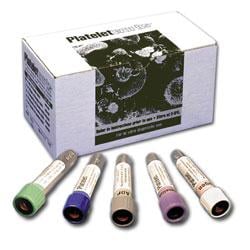
November 18, 2009 – Three platelet function tests identified patients who will have blood cells that remain sticky, increasing heart attack risk, despite being pretreated with two anti-clotting medications before coronary stenting. Researchers reported the findings at the American Heart Association’s Scientific Sessions this week.
POPULAR (Do platelet function assays predict clinical outcomes in clopidogrel pretreated patients undergoing elective PCI) is the first head-to-head comparison of tests for platelet reactivity despite anti-clotting medication. It examines which of the many tests available best predict thrombotic complications, such as heart attack and stroke, in patients pretreated with aspirin and clopidogrel who then undergo percutaneous coronary intervention (PCI) with stent implantation, said Jurrien M. ten Berg, M.D., Ph.D., an interventional cardiologist at St. Antonius Hospital, Nieuwegein, the Netherlands, and senior investigator of the study.
“Only a minority of centers routinely uses platelet reactivity testing to guide therapy, but it is used extensively as a research tool,” he said. “I think we are on the brink of making platelet reactivity a clinical tool.”
Dual anti-platelet therapy with aspirin and clopidogrel is used for its ability to reduce clot-related complications of PCI. But in some studies a significant number (30-40 percent) of patients are resistant to the treatment and are at risk of clot-related complications even after that treatment, said ten Berg.
Researchers haven’t conducted a large study comparing the many tests that check platelet reactivity, said Nicoline J. Breet, M.D., presenter of the study and a Ph.D. fellow and cardiologist-in-training at St. Antonius Hospital.
In POPULAR, researchers compared six different tests of platelet reactivity in 1,069 consecutive patients undergoing angioplasty with stent placement and included one-year follow-up. The primary endpoint was a composite of all-cause death, heart attack, urgent revascularization, stroke or blood clots arising within the stent (stent thrombosis), Dr. Berg said.
Patients who had high platelet reactivity (HPR) on three of the tests – the Light Transmittance Aggregometry (LTA), the VerifyNow-P2Y12-cartridge and the Plateletworks assay – had a significantly greater incidence of the combined primary endpoint (12.1 percent vs. 6 percent) at one year compared to patients who did not, he said. Data showed three other tests evaluated didn’t predict outcomes.
Of the three predictive tests, the LTA is the most labor-intensive and can’t be performed at bedside, and Plateletworks must be done within 10 minutes of drawing blood. The third test, VerifyNow-P2Y12 does not have those limitations, he said.
“It is useful to test the response to anti-platelet therapy in all patients undergoing elective angioplasty plus stent placement to identify those patients at highest risk for clot-related complications,” Berg added.
These results have not yet been extended to demonstrate that basing additional treatment(s) on the test results would improve patient outcomes in those at higher risk.
For more information: www.americanheart.org


 January 05, 2026
January 05, 2026 









